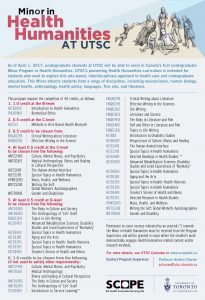
As of April 1 2017, undergraduate students at UTSC will be able to enrol in Canada’s first undergraduate Minor Program in Health Humanities. Links to the UTSC Calendar will be updated as they are made available. The information that follows is for students’ planning purposes, and may reflect updates that do not yet appear in the UTSC Calendar.
**Please note this page will be updating in Spring/Summer and occasionally throughout the academic year; if you have questions regarding specific courses or eligibility for the Health Humanities Minor, please contact Program Supervisor Prof. Charise directly.
Current and past Special Topics courses (C- and D-level) are listed here.
MINOR PROGRAM IN HEALTH HUMANITIES (ARTS)
**Updated December 2019 for 2019-2020 academic year.
The Minor in Health Humanities provides an interdisciplinary exploration of human health and illness through the methods and materials of the creative arts, humanities, and critical social sciences. Students’ understanding of the humanistic, philosophical, historical, and artistic study of health—past and present—will be developed by attending closely to how literature, philosophy, history, and critical social sciences reveal the aesthetic, ethical, and multicultural contexts of health, disability, medical research and policy. This interdisciplinary Minor is open to all undergraduates regardless of major or disciplinary background.
Students will note that some courses at the B-, C-, and D-levels may have additional pre- requisites; therefore, students selecting the Minor as a Subject POSt must choose their courses carefully to ensure that they have the necessary prerequisites. Permission to count courses indicated by an asterisk (*) towards the Minor in Health Humanities must be received from the Program Supervisor, and will be granted in cases where the student’s work demonstrably engages Health Humanities-related content and/or research methods.
Note: Relevant Health Humanities-related courses selected from other academic units and disciplines, not already listed below, may be approved for the Minor in Health Humanities on a case-by-case basis.
Program Requirements
This program requires the completion of 4.0 credits, as follows:
- 1.0 credit at the B-level:
HLTB50H3 Introduction to Health Humanities
PHLB09H3 Biomedical Ethics - 0.5 credit at the C-level:
HLTC55 Methods in Arts-Based Health Research - 0.5 credit to be chosen from:
ENGA02H3 Critical Writing about Literature
ENGB02H3 Effective Writing in the Sciences - At least 0.5 credit at the C-level to be chosen from the following:
ANTC24H3 Culture, Mental Illness, and Psychiatry
ANTC61H3 Medical Anthropology: Illness and Healing in Cultural Perspective
HLTC50H3 The Human-Animal Interface
HLTC52H3 Special Topics in Health Humanities
VPMC02H3 Music, Health, and Wellness
WSTC12H3 Writing the Self: Global Women’s Autobiographies
WSTC40H3 Gender and Disability - At least 0.5 credit at D-level to be chosen from the following:
ANTD01H3 The Body in Culture and Society
ANTD10H3 The Anthropology of ‘Life’ Itself
ENGD12H3 Topics in Life Writing
HLTD07H3 Advanced Rehabilitation Sciences: Disability Studies and Lived Experiences of ‘Normalcy’
HLTD50H3 Special Topics in Health Humanities
HLTD51H3 Aging and the Arts
HLTD52H3 Special Topics in Health: Health Histories
HLTD53H3 Special Topics in Health Humanities
HLTD54H3 Toronto’s Stories of Health and Illness - 1.0 credits to be chosen from the following (if not used to satisfy other requirements):
ANTC24H3 Culture, Mental Illness, and Psychiatry
ANTC61H3 Medical Anthropology: Illness and Healing in Cultural Perspective
ANTD01H3 The Body in Culture and Society
ANTD10H3 The Anthropology of ‘Life’ Itself
CTLB03H3 Introduction to Service Learning
ENGA02H3 Critical Writing about Literature
ENGB02H3 Effective Writing in the Sciences
ENGB12H3 Life Writing
ENGB52H3 Literature and Science
ENGB74H3 The Body in Literature and Film
ENGC44H3 Self and Other in Literature and Film
ENGD12H3 Topics in Life Writing
HLTBXX Introduction to Disability Studies
HLTB42H3 Perspectives of Culture, Illness and Healing
HLTC50H3 The Human-Animal Interface
HLTC52H3 Special Topics in Health Humanities
HLTD01H3 Directed Readings in Health Studies **
HLTD07H3 Advanced Rehabilitation Sciences: Disability Studies and Lived Experiences of ‘Normalcy’
HLTD50H3 Special Topics in Health Humanities
HLTD51H3 Aging and the Arts
HLTD52H3 Special Topics in Health: Health Histories
HLTD53H3 Special Topics in Health Humanities
Notes:
1. The courses listed in requirements 4-6 engage methods, content, and/or issues relevant to arts- and humanities-based approaches to health. They provide students with the opportunity to explore more specialized topics related to Health Humanities based on their academic interest and professional aspirations.
2. 0.5 credit can be earned by taking for-credit fine arts classes (e.g., music performance, visual arts, etc).
3. Permission to count HLTD01H3 (**) towards the Minor in Health Humanities must be received from the Program Supervisor. Permission will be granted only in cases where the student’s work demonstrably engages Health Humanities-related content and/or research methods.
Questions? Contact Program Supervisor Professor A. Charise (acharise@utsc.utoronto.ca).